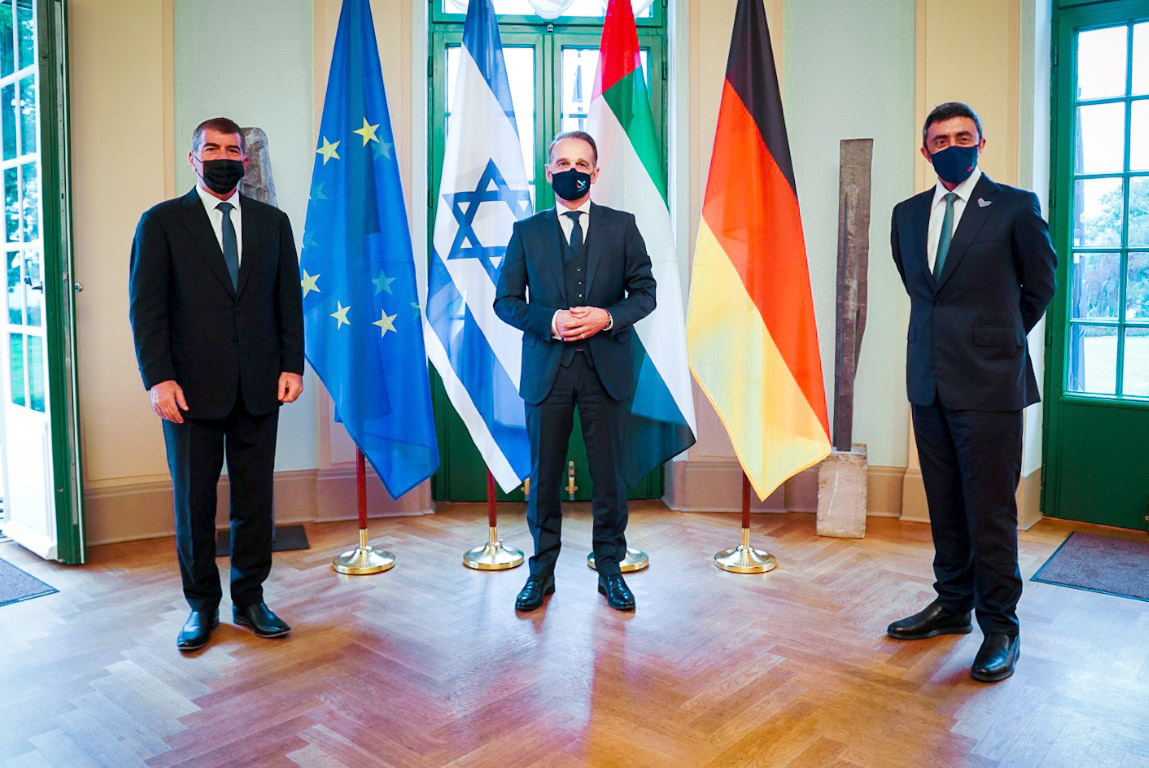DUBAI: The Middle East has taken its first steps toward a new era of security and prosperity, according to Emirati foreign minister Sheikh Abdullah bin Zayed. This is in line with his nation’s vision for a stable region, he said.
His comments came during a joint press conference in Berlin with his German and Israeli counterparts, Heiko Maas and Gabi Ashkenazi. The historic, face-to-face meeting of the Israeli and Emirati ministers was their first since their countries set aside decades of enmity and signed a US-brokered agreement in mid-September to normalize relations. Bahrain also signed a similar agreement with Israel.
Middle East entered a new era towards security and prosperity after the signing of the Abraham Accords Peace Agreement: Sheikh Abdullah bin Zayed #OFMUAE https://t.co/r3muUpDGWz pic.twitter.com/tWkKorE7jN
— OFM (@OFMUAE) October 6, 2020
Sheikh Abdullah said the agreement changes traditional thinking on ways to address regional challenges, and focuses on practical steps with tangible results.
He thanked Maas for hosting the meeting with “my new friend Gabi Ashkenazi” and added: “Three decades ago, the German people united Berlin to make history, and today we are gathered together in the hope of making history.”
He said the most important thing to emphasize is the return of the hope that the Palestinians and Israelis can work together to agree a two-state solution and a brighter future for the children of the region.
“In the UAE we are looking forward to opening more new horizons of cooperation to make peace, and to the economic opportunities that it opens up in the region,” he added.

German Foreign Minister Heiko Maas (C), stands with UAE Foreign Minister Abdullah bin Zayed (R), and Israeli Foreign Minister Gabi Ashkenazi (L), as they arrive for talks at the German foreign ministry’s guesthouse Villa Borsig Tuesday, Oct. 6, 2020, in Berlin, Germany. (WAM)
“We will work together to take advantage of our world-leading capabilities in the research and development sectors to meet the needs of current and future generations.”
The minister highlighted sectors such as food security, energy, trade, health, aviation and technology as providing opportunities to expand and strengthen cooperation in the region.
He said that to maximize the benefits of international cooperation, the UAE is committed to working with partners to promote international investment, and looking for partners in Germany and Israel.
“Today, I discussed with my colleague Gabi Ashkenazi a set of proposals and ideas — perhaps most notably cooperation in the field of energy and the Fourth Industrial Revolution — in recognition that cooperation in research and development could represent a step toward a more stable, integrated and prosperous Middle East,” said Sheikh Abdullah.
Sheikh Abdullah bin Zayed meets Israeli FM in Berlin #OFMUAE https://t.co/3mmDRIEM20 pic.twitter.com/y22jo21Yqd
— OFM (@OFMUAE) October 6, 2020
He added that the UAE, Germany and Israel share an interest in promoting tolerance and diversity in their countries, as well as promoting pluralism and moderation in the region. He said all three nations share a deep concern about the threats that extremism and terrorism pose to them and the world.
“Just as we do not compromise with terrorism, we must also not compromise with extremism and hatred,” he said, adding that the UAE shares with Germany and Israel a desire to preserve regional stability as part of a peaceful international order characterized by cooperation and stability.
Ashkenazi thanked the UAE for its courage, vision and the efforts it has made to achieve peace. The agreement between the two countries provides hope and good news to the citizens of both, he added, as well as the prospect of peace in the region. It also contributes to efforts to achieve stability and confront common challenges, he said, foremost among which is the coronavirus pandemic.
Earlier in the day, the Emirati and Israeli foreign ministers visited the Holocaust Memorial in Berlin.
Sheikh Abdullah bin Zayed visits Holocaust Memorial in Berlin #OFMUAE https://t.co/mDNNLDSCHH pic.twitter.com/s5Sik6cLj6
— OFM (@OFMUAE) October 6, 2020
Ashkenazi said the occasion “represented a new era of peace, development and hope, and we will see citizens of the UAE freely visit the State of Israel and all the holy sites, and we are looking forward to our citizens visiting the UAE soon.”
He added that discussions with his Emirati counterpart have been positive and presented a vision for relations between the two countries and future cooperation.
He said that “just peace is reached through courage and respect,” and called on the Palestinians to return to the negotiating table.
“Only through direct negotiations will we be able to find a solution to the conflict, and the longer we drag this one and the longer we wait for negotiations to start, the more difficult it will be and it will be transferred to future generations and they will be faced with a difficult reality,” Ashkenazi added.
Maas said Germany welcomed the signing of the Abraham Accords, the name given to the agreements with Israel signed by the UAE and Bahrain, and called the Israel-UAE agreement the “first good news in the Middle East for a long time.”
One thing is clear: a solution to the conflict between Israel and the Palestinians is crucial for long-term stabilization and peace in the region. Together with our partners, we are ready to accompany you on this path. - Foreign Minister @HeikoMaas 4/4 pic.twitter.com/8nQcshbEu8
— GermanForeignOffice (@GermanyDiplo) October 6, 2020
He urged them to go further still, however, and for the entire region to build on the momentum to find a lasting peace between Israel and the Palestinians. “This opportunity must be seized,” said Maas. His country currently holds the presidency of the EU, and he said the bloc is ready to help.
The UAE and Bahrain are the first Arab nations to establish normalized relations with Israel since Egypt in 1979 and Jordan in 1994.
Press conference with Foreign Minister @HeikoMaas, the Foreign Minister of Israel @Gabi_Ashkenazi @IsraelMFA@IsraelinGermany and the Foreign Minister of the United Arab Emirates @ABZayed@MoFAICUAE @UAEinBerlin https://t.co/9BV0LQhVCq
— GermanForeignOffice (@GermanyDiplo) October 6, 2020
(With AFP)









































